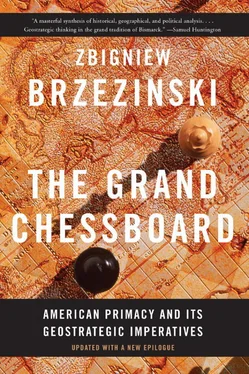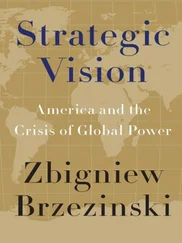Strategic Vision: America and the Crisis of Global Power (2012)
America and the World: Conversations on the Future of American Foreign Policy (2008)
Second Chance: Three Presidents and the Crisis of American Superpower (2007)
The Choice: Global Domination or Global Leadership (2004)
Out of Control: Global Turmoil on the Eve of the Twenty-first Century (1993)
The Grand Failure: The Birth and Death of Communism in the Twentieth Century (1989)
Game Plan: A Geostrategic Framework for the Conduct of the U.S.-Soviet Contest (1986)
Power and Principle: Memoirs of the National Security Adviser, 1977–1981 (1983)
Between Two Ages: America’s Role in the Technetronic Era (1970)
The Soviet Bloc: Unity and Conflict (1960)
Copyright © 1997 by Zbigniew Brzezinski.
Epilogue copyright © 2016 by Zbigniew Brzezinski.
Published in the United States by Basic Books, an imprint of Perseus Books, LLC, a subsidiary of Hachette Book Group, Inc.
All rights reserved. Printed in the United States of America. No part of this book may be reproduced in any manner whatsoever without written permission except in the case of brief quotations embodied in critical articles and reviews. For information, address Basic Books, 250 W. 57th St, 15th floor, New York, NY 10107.
Books published by Basic Books are available at special discounts for bulk purchases in the United States by corporations, institutions, and other organizations. For more information, please contact the Special Markets Department at the Perseus Books Group, 2300 Chestnut Street, Suite 200, Philadelphia, PA 19103, or call (800) 810-4145, ext. 5000, or e-mail special.markets@perseusbooks.com.
Designed by Elliott Beard
Maps by Kenneth Velasquez
Library of Congress Cataloging-in-Publication Data
Brzezinski, Zbigniew K., 1928–
The grand chessboard: American primacy and its geostrategic imperatives / Zbigniew Brzezinski.—1st ed.
p. cm.
Includes index.
1. United States—Foreign relations—1989– 2. Geopolitics—United States—History—20th Century. 3. Geopolitics—History—20th century. 4. World politics—1989–5. Eurasia—Strategic aspects.
I. Title.
E840.B785 1997 97-13812
327.73—dc20 CIP
ISBN: 978-0-465-09308-3 (2016 e-book)
10 9 8 7 6 5 4 3 2 1
Donald Puchala. “The History of the Future of International Relations,” Ethics and International Affairs 8 (1994):183.
From his paper “Creating Liberal Order: The Origins and Persistence of the Postwar Western Settlement,” University of Pennsylvania, Philadelphia, November 1995.
Samuel P. Huntington. “Why International Primacy Matters,” International Security (Spring 1993):83.
Roy Denman, Missed Chances (London: Cassell, 1996).
In Robert Skidelsky’s contribution on “Great Britain and the New Europe,” in From the Atlantic to the Urals, ed. David P. Calleo and Philip H. Gordon (Arlington, Va.: 1992), p. 145.
A. Bogaturov and V. Kremenyuk (both senior scholars in the Institute of the United States and Canada), in “Current Relations and Prospects for Interaction Between Russia and the United States,” Nezavisimaya Gazeta , June 28, 1996.
For example, as a percentage of overall budget, Germany accounts for EU: 28.5 percent; NATO: 22.8 percent; UN 8.93 percent, in addition to being the largest shareholder in the World Bank and the EBRD (European Bank for Reconstruction and Development).
As quoted by Le Nouvel Observateur , August 12, 1996.
Cf. his History of Europe, from the Pyrenean Peace to the Death of Louis XIV.
Politiken Sondag, August 2, 1996, italics added.
It is noteworthy that influential voices both in Finland and in Sweden have began to discuss the possibility of association with NATO. In May 1996, the commander of the Finnish Defense Forces was reported by the Swedish media to have raised the possibility of some NATO deployments on Nordic soil, and in August 1996, the Swedish Parliament’s Defense Committee, in an action symptomatic of a gradual drift toward closer security cooperation with NATO, recommended that Sweden join the Western European Armaments Group (WEAG) to which only NATO members belong.
In “Our Security Predicament,” Foreign Policy 88 (Fall 1992):60.
Aleksandr Prokhanov. “Tragedy of Centralism,” Literaturnaya Rossiya, January 1990, pp. 4–5.
Interview in Rossiyskaya Gazeta , January 12, 1992.
A. Bogaturov and V. Kremenyuk (both senior scholars in the Institute of the United States and Canada), in “The Americans Themselves Will Never Stop,” Nezavisimaya Gazeta , June 28, 1996.
For example, even Yeltsin’s top adviser, Dmitryi Ryurikov, was quoted by Interfax (November 20, 1996) as considering Ukraine to be “a temporary phenomenon,” while Moscow’s Obshchaya Gazeta (December 10, 1996) reported that “in the foreseeable future events in eastern Ukraine may confront Russia with a very difficult problem. Mass manifestations of discontent… will be accompanied by appeals to Russia, or even demands, to take over the region. Quite a few people in Moscow would be ready to support such plans.” Western concerns regarding Russian intentions were certainly not eased by Russian demands for Crimea and Sevastopol, nor by such provocative acts as the deliberate inclusion in late 1996 of Sevastopol in Russian public television’s nightly weather forecasts for Russian cities.
N. S. Trubetzkoy. “The Legacy of Genghis Khan,” Cross Currents 9 (1990):68.
Interview with L’Espresso (Rome), July 15, 1994.
Aleksei Bogaturov. “Current Relations and Prospects for Interaction Between Russia and the United States,” Nezavisimaya Gazeta , June 28, 1996.
In early 1996, General Aleksandr Lebed published a remarkable article (“The Fading of Empire or the Rebirth of Russia,” Segodnya , April 26, 1996) that went a long way toward making that case.
Zavtra 28 (June 1996).
“What Russia Wants in the Transcaucasus and Central Asia,” Nezavisimaya Gazeta , January 24, 1995.
“Official Document Anticipates Disorder During the Post-Deng Period,” Cheng Ming (Hong Kong), February 1, 1995, provides a detailed summary of two analyses prepared for the Party leadership concerning various forms of potential unrest. A Western perspective on the same topic is contained in Richard Baum, “China After Deng: Ten Scenarios in Search of Reality,” China Quarterly (March 1996).
In the somewhat optimistic report titled “China’s Economy Toward the 21st Century” ( Zou xiang 21 shi ji de Zhongguo jinji ), issued in 1996 by the Chinese Institute for Quantitative Economic and Technological Studies, it was estimated that the per capita income in China in 2010 will be approximately $735, or less than $30 higher than the World Bank definition of a lowincome country.
Читать дальше












